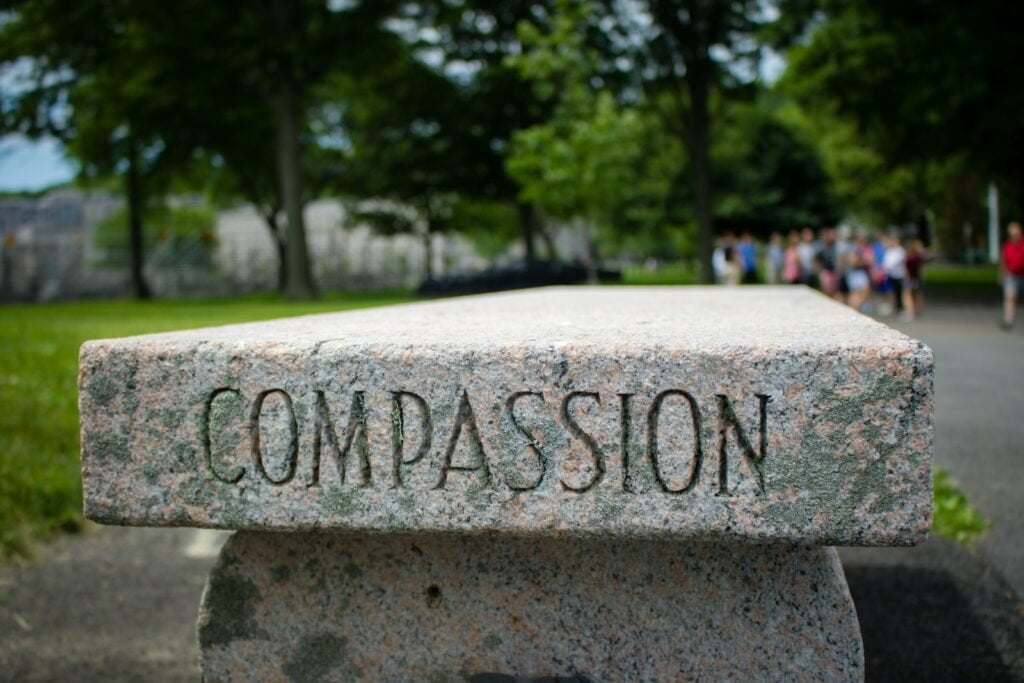Defeating adversity with self-compassion and gratitude

Adversity is a common experience, but can we use self-compassion and gratitude to defeat it? It can be challenging to know how to cope with adversity when we face it. Research has shown that practicing self-compassion and gratitude can help us manage the difficult emotions that arise during tough times and ultimately emerge stronger.
Adversity is a part of life, and it can take many forms. From losing a job to experiencing a personal tragedy, adversity can shake us to our core and make it difficult to move forward. When practicing self-compassion and gratitude, you can not only weather the storm of adversity but emerge stronger and more resilient on the other side.
As a bereavement, grief and loss specialist, I have seen first hand the toll that adversity can take on the most resilient people. Whether it is the loss of a loved one, a difficult diagnosis, or a major life change, adversity can leave us feeling overwhelmed, anxious, and uncertain about the future. However, I have also seen the transformative power of self-compassion and gratitude in helping individuals to overcome adversity and move forward with resilience.
In this article, we will explore the ways in which self-compassion and gratitude can help us to overcome adversity, including specific strategies for cultivating these qualities in our lives. Whether you are facing a difficult challenge in your personal or professional life, or simply seeking to build greater resilience and well-being, the power of self-compassion and gratitude can help you to defeat adversity and thrive.

Table of Contents
Gratitude- a lighthouse in the sea of adversity
Gratitude can be a beacon of hope and light in the midst of adversity, much like a lighthouse guiding a ship to safety in a stormy sea. When we face difficult times, it can be easy to become overwhelmed by fear, sadness, and despair. However, by cultivating gratitude, we can find a sense of grounding, peace, and even joy, even in the midst of challenging circumstances.
Like a lighthouse, gratitude can help to guide us through the darkness, reminding us that there is still goodness and beauty to be found in the world. It can help us to recognize and appreciate the simple pleasures in life, such as the warmth of the sun on our skin, the sound of laughter, or the taste of a delicious meal. By focusing on these positive aspects of life, we can create a sense of balance and perspective that can help us to cope with even the most difficult of situations.
Gratitude for the smallest things we have and hold dear in our lives, can bring a sense of resilience and strength in the face of adversity. By focusing on the good things in our lives, we may feel more hopeful, optimistic, and motivated to overcome our challenges. We may be better able to find creative solutions to problems, to connect with others for support, and to tap into our inner resources of strength and resilience.
Gratitude can serve as a powerful source of light and hope in the face of adversity, reminding us that even in the darkest of times, there is still goodness and beauty to be found in the world. By cultivating a sense of gratitude and appreciation, we can tap into a deep well of resilience and strength that can help us to weather any storm.
Defeating adversity starts with self-compassion
Self-compassion can be a warm blanket made of the most beautiful and comforting feelings, providing us with protection and comfort in the midst of a terrible storm. When we face adversity, it can feel like we are being battered by winds and pelted by rain and snow. We may feel cold, alone, and vulnerable. However, self-compassion can offer us a shield of warmth and comfort, reminding us that we are not alone and that we have the inner resources to weather the storm.
Just as a warm blanket can wrap us in a sense of safety and security, self-compassion can help us to feel more grounded and centered, even in the face of difficult emotions or experiences. It can provide us with a sense of comfort, nurturing, and love, reminding us that we are deserving of care and kindness, no matter what challenges we may be facing. By offering ourselves the same compassion and care that we would offer to a dear friend, we can create a powerful inner resource that can help us to overcome adversity with greater resilience, strength, and grace.
In face of adversity, recognizing and accepting our own flaws and limitations, without judgment or self-criticism, could be the beginning of understanding the very fabric of self-compassion and what is :
- Self-kindness: Self-kindness involves treating ourselves with warmth, empathy, and understanding. This means being gentle and supportive with ourselves, rather than harsh or critical. When we practice self-kindness, we offer ourselves the same comfort and care that we would offer to a friend in need.
- Common humanity: This component of self-compassion involves recognizing that we are not alone in our struggles. We all face difficulties, setbacks, and failures at times, and it is important to remember that this is a normal part of the human experience. When we acknowledge our shared humanity, we can feel less isolated and more connected to others.
- Mindfulness: Mindfulness involves being present and non-judgmental in the face of difficult emotions or experiences. Rather than getting caught up in negative thoughts or feelings, we can learn to observe them with curiosity and compassion. When we practice mindfulness, we are better able to regulate our emotions and respond to challenges with greater clarity and wisdom.
Together, these three components of self-compassion can help us to cultivate a more supportive and caring relationship with ourselves, even in the face of adversity. By practicing self-compassion, we can learn to treat ourselves with greater kindness, resilience, and inner strength.
According to a study published in the Journal of Positive Psychology, individuals who practice self-compassion and gratitude are more likely to experience positive emotions, have a greater sense of purpose in life, and be more satisfied with their lives overall. Additionally, self-compassion and gratitude have been shown to improve mental health outcomes, including reducing symptoms of depression and anxiety.
Self-compassion is a practice of treating ourselves with the same kindness, concern, and understanding that we would offer to a close friend who is struggling. It involves recognizing and accepting our own suffering and treating ourselves with kindness and compassion rather than harsh self-judgment.
Compassion is not limited to the ability to understand and empathize with others but to celebrate and support their dreams. It’s different from sympathy, which is feeling sorry for someone. True compassion allows us to connect with others on a deeper level and to show them kindness and understanding for their inner potential. When we show real compassion to others, we also show it to ourselves.
Rich Woman Magazine
Research has shown that practicing self-compassion can have a range of positive effects, including reducing symptoms of depression and anxiety and improving emotional resilience. When we are kind and understanding toward ourselves, we are better able to regulate our emotions and respond to challenges in a healthy, adaptive way.

How Self-Compassion and Gratitude Work Together
Gratitude can help us to cultivate a more positive outlook on life, even in the face of adversity. When we focus on the good things in our lives, we may feel more optimistic, hopeful, and resilient. We may be better able to see the opportunities for growth and learning that can arise from challenging experiences.
Finding the silver lining in the face of adversity requires self-discipline to combine gratitude and appreciation for the good things in our lives, even when things may be tough, with self-compassion. It is important to focus on the positive and create a sense of balance, perspective, and resilience. It is never easy to be self-compassionate, but it can help you to navigate even the most challenging of circumstances with greater strength and grace.
Self-compassion and gratitude work together to help us overcome adversity and there is scientific evidence showing how the mind works. First, practicing self-compassion can help us recognize and accept our own suffering, which can make it easier to cultivate feelings of gratitude and focus on the positive aspects of our lives. When we are kind and understanding toward ourselves, we are better able to see the good in the world around us and appreciate the blessings in our lives.
Cultivating gratitude can help us stay motivated and engaged during difficult times, which can help us maintain our resilience and bounce back more quickly. By focusing on what we are grateful for, we can cultivate positive emotions that help us stay connected to others and maintain a sense of hope and purpose.

The road from adversity to self-compassion and gratitude
While self-compassion and gratitude are powerful tools for overcoming adversity, they can be difficult to practice consistently. Many of us have deeply ingrained patterns of negative self-talk and find it challenging to focus on the positive during tough times. However, with practice, it is possible to overcome these obstacles and build a more positive mindset.
One of the keys to cultivating self-compassion and gratitude is to practice regularly, even when we don’t feel like it. This means making a commitment to ourselves to engage in these practices daily, even when we are feeling overwhelmed or discouraged. Over time, these practices can become habits that help us stay focused and grounded, even in the midst of difficult circumstances.
Another obstacle to self-compassion and gratitude is the tendency to compare ourselves to others. When we see others who appear to be thriving despite adversity, we may feel inadequate or like we are doing something wrong. However, it’s important to remember that everyone’s journey is unique, and there is no one right way to cope with difficult times. By focusing on our own experiences and cultivating self-compassion and gratitude, we can build resilience and thrive, no matter what life throws our way.

Practical Tips for Practicing Self-Compassion and Gratitude to defeat adversity
When we face adversity, it can be difficult to see any light at the end of the tunnel. We may feel overwhelmed, discouraged, and even hopeless. However, cultivating a sense of gratitude can help us to find the silver lining in even the darkest of situations.
Gratitude involves recognizing and appreciating the good things in our lives, even when they may be overshadowed by challenges or difficulties. It is not about denying the reality of our struggles, but rather about shifting our focus to the positive aspects of our lives that we may take for granted.
In the face of adversity, gratitude can be a powerful tool for resilience and healing. By focusing on the good things in our lives, we can create a sense of balance and perspective that can help us to cope with difficult emotions or experiences. We may find that even in the midst of hardship, there are still moments of joy, beauty, and connection to be found.
There are several practical steps you can take to start practicing self-compassion and gratitude in your own life. Some ideas include:
- Journaling about things you are grateful for each day
- Practicing self-compassion by treating yourself with kindness and understanding, even when things don’t go as planned
- Engaging in activities that bring you joy and help you stay connected to others
- Challenging negative self-talk and replacing it with kind, compassionate self-talk

Final Thoughts
Adversity is a part of life, but with the right mindset and practices, we can overcome even the most challenging circumstances. By cultivating self-compassion and gratitude, we can build resilience and thrive, no matter what challenges we face. Whether we are dealing with a personal tragedy, a job loss, or a difficult relationship, the power of self-compassion and gratitude can help us find meaning and purpose even in the darkest of times.
Cultivating Gratitude
Gratitude is another powerful tool for overcoming adversity. By focusing on what we are grateful for, we can shift our perspective and find meaning and purpose even in difficult times. Gratitude can also help us cultivate positive emotions like joy and contentment, which can help us stay motivated and engaged even when things are tough.
Finding the Silver Lining
When we face adversity, it can be difficult to see any positive outcomes or opportunities. However, by practicing gratitude and looking for the silver lining, we can find meaning and purpose even in challenging situations. This can help us stay motivated and focused on our goals, even when the road ahead seems uncertain.
Building Resilience
Practicing self-compassion and gratitude can help us build resilience, or our ability to bounce back from difficult situations. By cultivating positive emotions and self-compassion, we are better able to regulate our emotions and cope with stress in a healthy way. This can help us stay motivated and focused on our goals, even in the face of adversity.
Adversity is a part of life, but by practicing self-compassion and gratitude, we can not only survive difficult times but thrive. By focusing on the positive and treating ourselves with kindness and compassion, we can build resilience and emerge stronger on the other side. Connect with me. Everybody can tell you that I am a compassionate listener…





